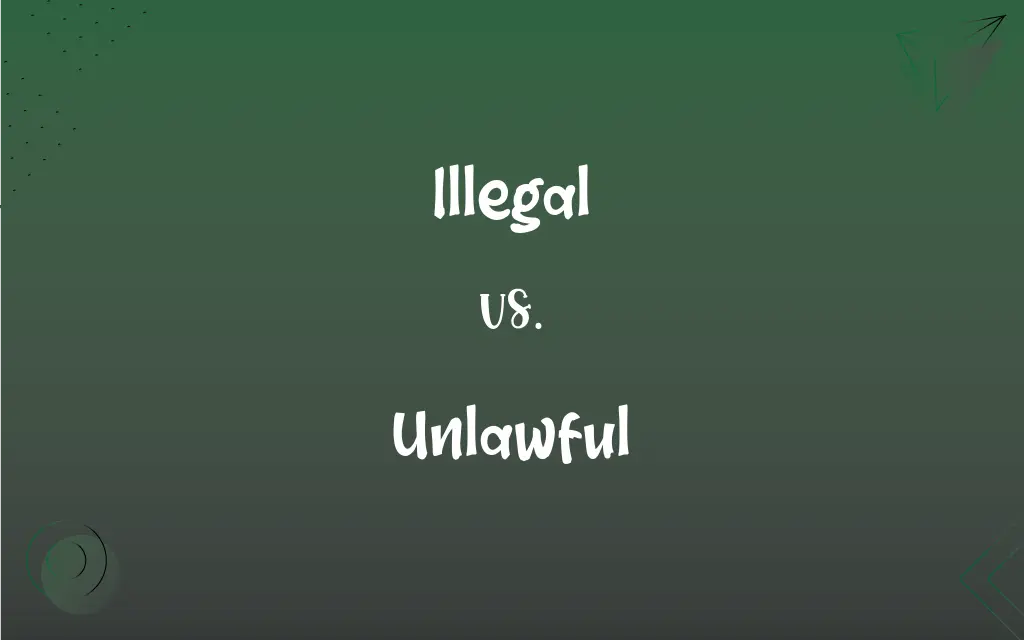Illegal vs. Unlawful: What's the Difference?
Edited by Harlon Moss || By Janet White || Published on December 15, 2023
Illegal refers to actions that violate specific laws, while unlawful broadly covers anything against the law, including civil law violations.

Key Differences
Illegal actions specifically break statutes or regulations in criminal law. While, unlawful acts encompass a broader range of legal violations, including civil laws.
Illegal activities often involve direct penalties like fines or imprisonment. Whereas, unlawful acts can lead to legal consequences such as civil lawsuits or non-criminal sanctions.
The term 'illegal' is commonly used in contexts like illegal drugs or illegal activities, indicating clear statutory violations. 'Unlawful' is often used in legal contexts to describe actions that are not authorized by or consistent with the law, including non-criminal violations.
Illegal is a more specific term, generally associated with a clear, codified breach of law. Unlawful has a broader, more general application, often used in legal judgments or formal settings.
Comparison Chart
Definition
Violation of specific criminal laws.
Anything against the law, including civil violations.
ADVERTISEMENT
Legal Context
Primarily used in criminal law contexts.
Used in both criminal and civil law contexts.
Consequences
Often involves criminal penalties like fines or imprisonment.
Can lead to civil lawsuits or non-criminal sanctions.
Common Usage
Used for clear, direct breaches of law.
Broader use, including actions not authorized by law.
Specificity
More specific to criminal acts.
More general, covering a wide range of legal violations.
Illegal and Unlawful Definitions
Illegal
Not allowed by the official legal system.
The company faced charges for illegal dumping of waste.
ADVERTISEMENT
Unlawful
Non-compliance with legal standards or regulations.
The builder’s actions were found to be unlawful.
Illegal
Forbidden by law or statute.
Selling illegal drugs is a criminal offense.
Unlawful
Actions that are not legally acceptable.
The unlawful use of copyrighted material is a civil offense.
Illegal
Against the rules set by an authority.
Parking in a no-parking zone is illegal.
Unlawful
Not permitted by law, broader than criminal law.
The court declared the policy change as unlawful.
Illegal
Involving activities that break specific laws.
Illegal hacking into secure networks is punishable by law.
Unlawful
Against or not authorized by the legal system.
Unlawful discrimination is prohibited in the workplace.
Illegal
Prohibited actions under criminal law.
Shoplifting is an illegal activity.
Unlawful
Infringing upon civil laws or regulations.
Unlawful occupation of property can lead to eviction.
Illegal
Prohibited by law.
Unlawful
Not lawful; illegal.
Illegal
Prohibited by official rules
An illegal pass in football.
Unlawful
Contrary to accepted morality or convention; illicit.
FAQs
Is "illegal" only applicable to criminal laws?
Primarily, it refers to violations of criminal laws.
Can "unlawful" refer to non-criminal acts?
Yes, it includes civil law violations and broader legal transgressions.
Is "illegal" used more in everyday language?
Yes, it's commonly used to refer to clear-cut legal violations.
Can a business practice be unlawful but not illegal?
Yes, if it violates civil laws or regulations but not criminal statutes.
Can an action be illegal in one country and lawful in another?
Yes, legal standards vary between jurisdictions.
Do illegal actions always lead to legal proceedings?
Generally, yes, especially if they involve significant legal breaches.
Is illegal downloading a form of theft?
Legally, it's considered a violation of copyright laws.
Can unlawful acts result in damages being awarded?
Yes, especially in civil lawsuits.
Is "unlawful" a broader term than "illegal"?
Yes, it encompasses a wider range of legal violations.
Are all unlawful acts also illegal?
Not necessarily, as "unlawful" can cover acts that are not criminally illegal.
Are illegal acts always punishable by jail time?
Not always, they can also result in fines or other penalties.
Can a contract be unlawful?
Yes, if it involves terms that violate legal standards.
Are there grey areas in determining if an act is illegal?
Yes, especially in complex legal scenarios.
Can an action be legal but unlawful?
This is unlikely, as "unlawful" generally implies legal prohibition.
Does illegal always imply a deliberate act?
Typically, but there can be cases of unintentional illegal actions.
Are illegal activities always harmful?
They often have negative consequences, though the extent can vary.
Do illegal actions affect a person's criminal record?
Yes, especially if they result in criminal convictions.
Can something be morally wrong but not unlawful?
Yes, not all moral wrongs are covered by law.
Can a law be unlawful?
Yes, if it contradicts higher legal principles or rights.
Can an unlawful act become legal over time?
Yes, if laws or legal interpretations change.
About Author
Written by
Janet WhiteJanet White has been an esteemed writer and blogger for Difference Wiki. Holding a Master's degree in Science and Medical Journalism from the prestigious Boston University, she has consistently demonstrated her expertise and passion for her field. When she's not immersed in her work, Janet relishes her time exercising, delving into a good book, and cherishing moments with friends and family.
Edited by
Harlon MossHarlon is a seasoned quality moderator and accomplished content writer for Difference Wiki. An alumnus of the prestigious University of California, he earned his degree in Computer Science. Leveraging his academic background, Harlon brings a meticulous and informed perspective to his work, ensuring content accuracy and excellence.





































































